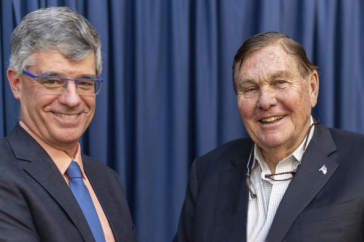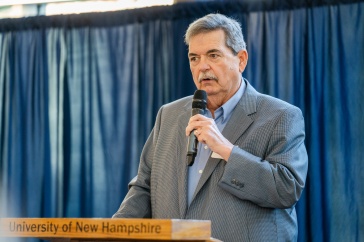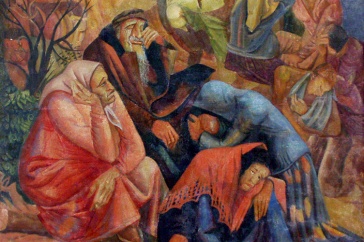
Students have been integral to the multi-year study COLSA professor Peter Pekins, center, recently completed in New Hampshire’s North Country to track the relationship between declining moose populations and burgeoning winter tick counts.
Cody Symonds ’19 can tell you how many ticks fit on a 10-month-old moose, and the answer isn’t pretty. “The number can vary significantly from year to year, but the average is around 47,000,” he says.
Symonds spent the summer of 2018 tracking moose in New Hampshire’s North Country, recording data on how many cows had given birth to calves — and counting the tick loads on juveniles who had succumbed to the pernicious parasite, which can drain an animal’s entire blood supply in a matter of weeks. A wildlife and conservation biology major in UNH’s College of Life Sciences and Agriculture (COLSA), Symonds worked as a research technician for natural resources professor Peter Pekins, who has spent the last five years documenting the impact of surging winter tick populations on northern New England’s iconic ungulate.
Symonds’ contributions to Pekins’ study were made possible thanks to a Weeks Summer Research Fellowship, which funds research opportunities for faculty-nominated COLSA students who don’t have prior research experience.
By providing research experiences for students who don’t otherwise have a background in academic research, the Weeks’ gift forges a critical pathway to the most competitive undergraduate research opportunities at UNH.
Jack ’55 and Pat Weeks originally established the Weeks Fund in the 1990s as a discretionary resource for the COLSA dean’s office. Jack Weeks says he’s pleased with the way the fund has evolved to support students early in their research careers. “I can’t take credit for any of the projects the college has chosen to support,” says the former university trustee and retired president of Weeks Dairy. “But I’ve been really interested in the work these students and their professors are doing, and I know how important research opportunities are for college students these days.”
By providing research experiences for students who don’t otherwise have a background in academic research, the Weeks’ gift forges a critical pathway to the most competitive undergraduate research opportunities at UNH. Pekins, whose moose study is currently garnering significant national attention, says it’s an important avenue through which COLSA faculty members can invest in students’ development.
“There’s value to having students work on your research, but really it’s a two-way street,” he says. “We faculty members have the responsibility to make sure what our students get from the experience is more than just labor. These fellowships provide work experience, life experience and educational experience that’s above and beyond what we can offer in the classroom.”
Symonds says his summer working for Pekins delivered on all those counts.
“The project greatly enhanced my college experience,” says the four-year member of the UNH men’s track and cross-country teams, who stayed on with Pekins’ project this fall. “It taught me a lot of things that are hard to learn in a classroom setting and gave me hands-on skills that I will need to be successful in the workforce.”
Interested in making a gift to a UNH college, school or program that matters to you? Find out how.
-
Written By:
Kristin Waterfield Duisberg | Communications and Public Affairs



















































